Key takeaways:
- Grief and guilt are interconnected emotions that can serve as markers of love, leading to the need for understanding and healing.
- Hospital ministry provides crucial emotional and spiritual support, helping patients and families navigate challenging experiences.
- Support systems, including friends and support groups, play a vital role in alleviating the isolation of grief and fostering connections.
- Coping mechanisms such as rituals, journaling, and volunteer work can transform grief into a path for personal healing and purpose.
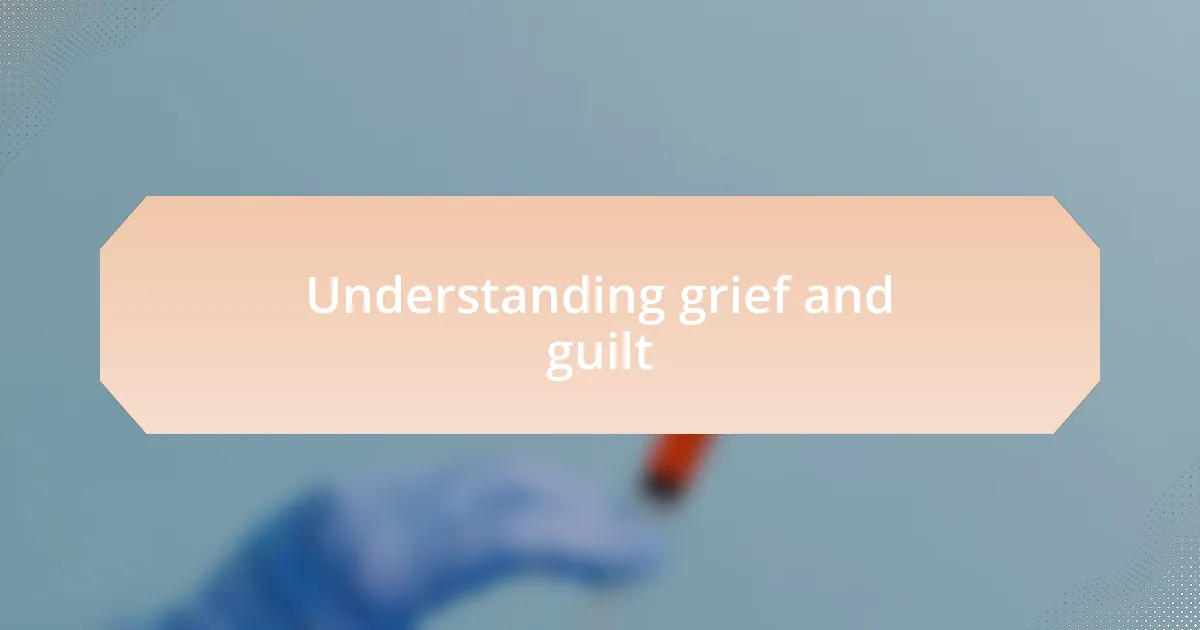
Understanding grief and guilt
Grief and guilt are intricately linked emotions that often intertwine during our most vulnerable moments. I remember feeling overwhelmed by guilt after the loss of a loved one, questioning whether I could have done more to support them. It’s a painful realization that many of us face: what if I had just called one more time?
As I navigated my own grief journey, I began to understand that guilt can surface as a misguided attempt to hold onto the past. Why do we torture ourselves with “what if” scenarios when we are already hurting? It seemed like the guilt served as a marker of love and connection, a way to grapple with the reality of loss, even though it was counterproductive.
In reflecting on my experiences, I realized that understanding these emotions can offer a pathway to healing. Grief is demanding in its rawness, yet guilt highlights our care and concern for our loved ones. How do we begin to transform that guilt into something constructive, rather than allowing it to weigh us down further? It’s a question worth pondering as we seek comfort and clarity amid our sorrow.
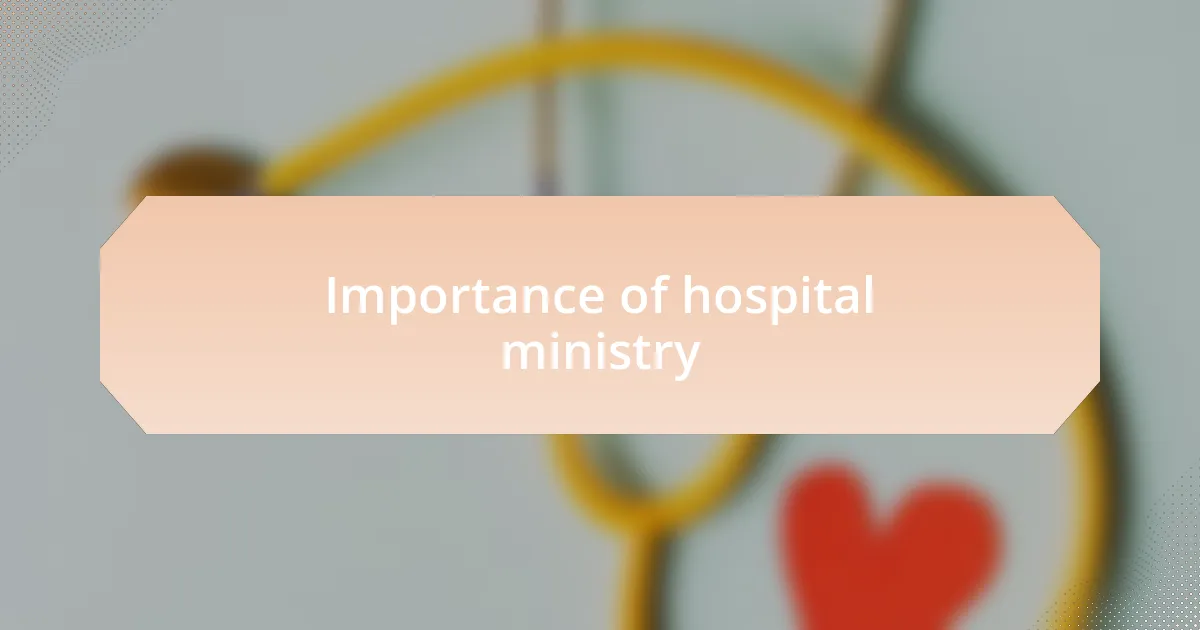
Importance of hospital ministry
Hospitals can be isolating places, filled with uncertainty and fear. That’s precisely where hospital ministry steps in to make a significant difference. I recall a time when I was visiting a friend in the hospital; he was overwhelmed by anxiety about his diagnosis. The hospital chaplain’s calming presence and compassionate words provided reassurance not only to him but also to me, illustrating the vital role of spiritual support in such challenging moments.
In my experience, hospital ministry addresses not just the physical ailments but the emotional and spiritual struggles patients and families face. I remember, during my darkest hours, how a simple prayer offered by a hospital minister calmed my racing thoughts. They individualized their approach, asking questions that encouraged me to express my fears and wishes. This connection is crucial, as it fosters a sense of community and understanding when one often feels utterly alone.
Ultimately, the importance of hospital ministry lies in its ability to create a safe space for healing. It encourages conversations about life, loss, and hope, making the hospital experience more bearable. How many times have we wished for someone to guide us through? In my case, it was a single conversation with a minister that shifted my perspective and reminded me that even in despair, support is available.
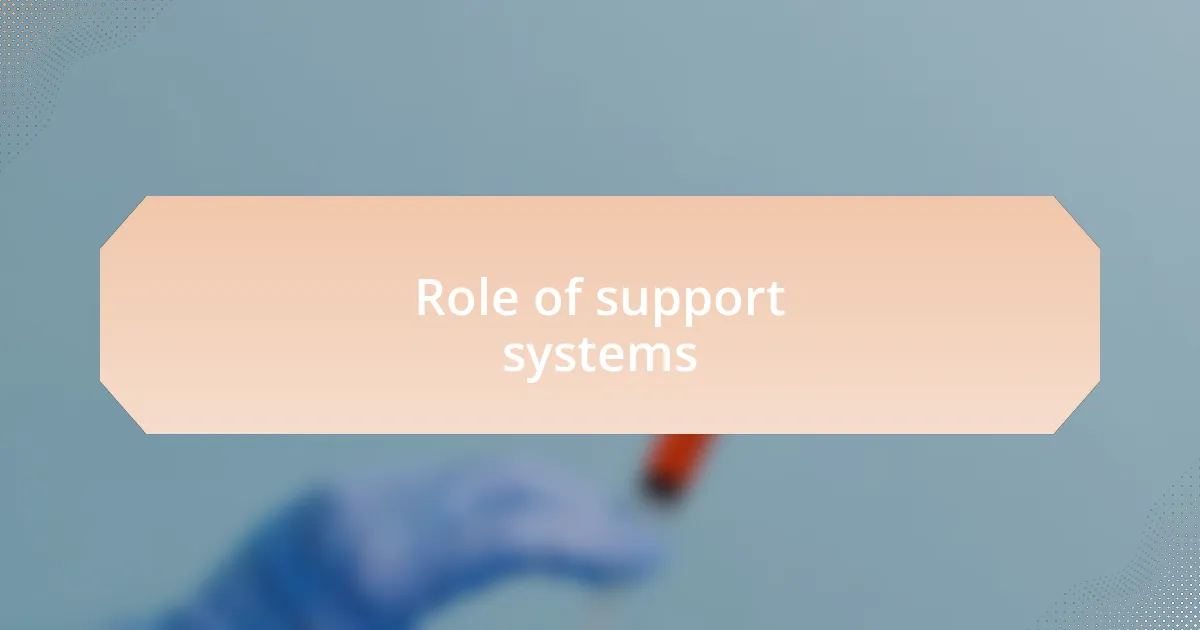
Role of support systems
Support systems play a crucial role in the journey through grief and guilt, especially during the hospital experience. I vividly remember a moment when a fellow patient’s family reached out to me during a particularly tough day. Their simple act of sharing meals and exchanging stories created an unexpected bond. In that setting, our shared pain became a source of comfort, reminding me that I wasn’t alone in my struggles.
The presence of friends, family, or even a support group can offer a lifeline. I often found solace in the casual meet-ups with individuals who were also navigating the murky waters of loss. Hearing someone articulate their own guilt allowed me to confront mine. It was as if we were each holding a mirror, reflecting our experiences and truths, validating our feelings in a space that often felt overwhelming.
Looking back, I understand that these support systems can be just as vital as medical care. They provide not just emotional relief but also practical assistance—whether it’s running errands or simply being there to listen. Have you ever found peace just by knowing someone truly understands? For me, those shared glances and nods of empathy became a source of strength, reshaping my approach to grief and the guilt that accompanied it.
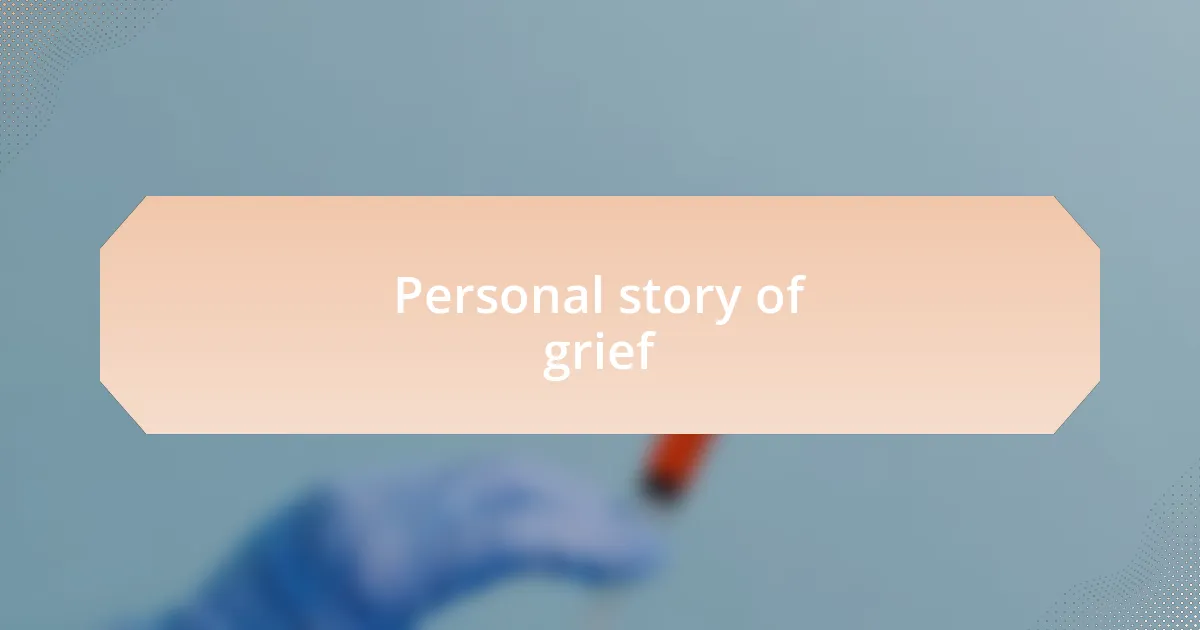
Personal story of grief
Grief hits you like a wave, unpredictable and sometimes overwhelming. I remember one evening sitting in the quiet of my hospital room, feeling the weight of loss settle in my chest. I had just lost a dear friend, and in that silence, I wrestled with my guilt—wondering if I could have done something to change the outcome. It’s in these moments of solitude that the rawness of pain often becomes most palpable, isn’t it?
One particular night, those feelings bubbled to the surface as I sat by the hospital window, staring out at the distant twinkling lights. I couldn’t help but reflect on the time I had spent with my friend, the laughter and the plans we had made. Suddenly, the sorrow I felt morphed into guilt, urging me to question what more I could have offered in our friendship. Have you ever faced this inner turmoil? It can feel like a relentless shadow, always lurking just behind you, whispering doubts that can be hard to silence.
Connecting with others who have faced similar experiences made a profound difference in my healing process. In a support group, I listened as individuals shared their stories, and with each narrative, I felt a little less isolated. One woman spoke of her own regrets, and it opened a floodgate within me—her words affirmed that I wasn’t alone in my feelings, and that my guilt, while heavy, was part of a shared human experience. How liberating it is to find understanding in such vulnerability! Through these conversations, I learned to embrace my grief and guilt, allowing them to become pathways toward healing instead of barriers.
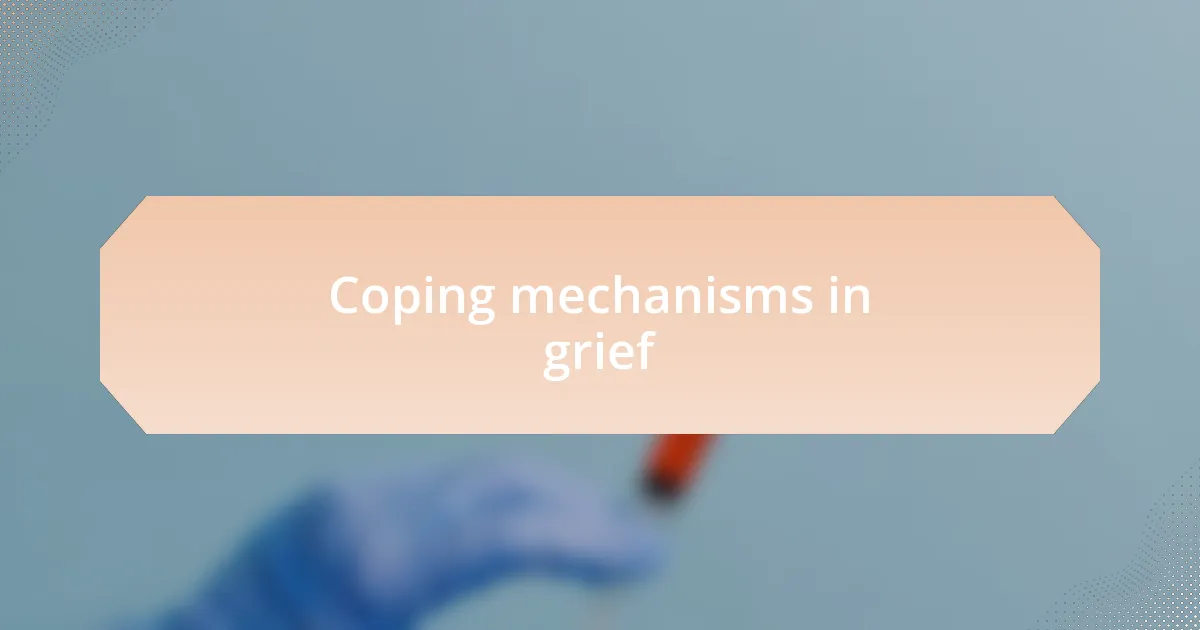
Coping mechanisms in grief
Coping with grief can feel like navigating through a fog, but I found comfort in simple rituals. For instance, I started lighting a candle each evening in memory of my friend. This small act transformed my sorrow into a moment of reflection, allowing me to celebrate his life while acknowledging the pain of his absence.
I also discovered journaling as a powerful outlet. Each night, I’d pour my thoughts onto the pages, letting the ink capture my turmoil and confusion. It felt liberating to articulate my feelings, almost like having a conversation with myself, where I could freely express my guilt without judgment. Have you ever tried writing out your emotions? It’s an effective way to sift through the chaos in your heart.
Another mechanism that helped me was engaging in volunteer work, which shifted my focus outward. I remember spending time at a local shelter, witnessing the gratitude of those I was helping. It reminded me of the importance of connection; while my grief was deeply personal, reaching out to others not only honored my friend’s memory but also healed pieces of my own heart. How valuable it is to find purpose in the midst of pain!
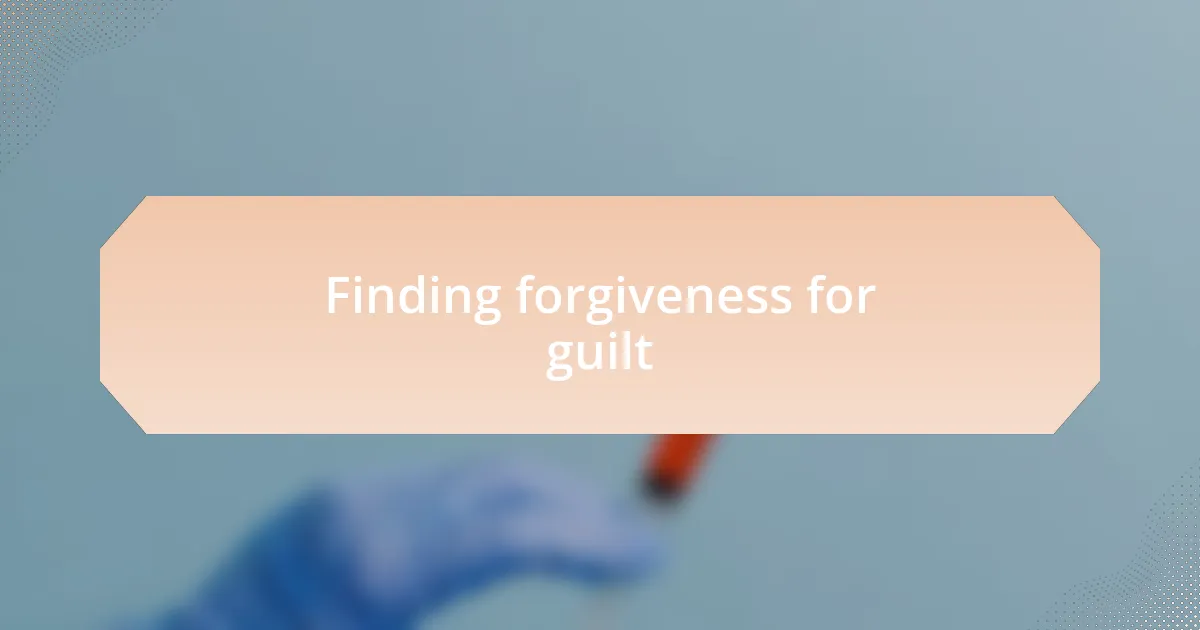
Finding forgiveness for guilt
Acknowledging guilt can feel heavy, like a weight on the heart. I vividly remember sitting in a quiet room, grappling with memories of conversations I wished I’d had—or things I thought I could have done differently. Have you ever found yourself wondering if you missed a chance to make things right? In those moments, I learned that embracing my feelings, rather than shying away from them, was essential for my healing journey.
Forgiveness felt elusive, almost like a distant dream. I once read about forgiving oneself as a path toward healing. It struck a chord within me. I began to mold my thoughts around the idea that my guilt stemmed from love. After all, if I hadn’t cared so deeply, I wouldn’t have such strong feelings of regret. So, I started to visualize forgiveness not as absolution but as an understanding that my intentions were rooted in love.
Eventually, I realized forgiveness is a process. There were days when guilt crept back in, catching me off guard, making me spiral into doubt. But each time, I reminded myself that forgiveness isn’t a one-time event; it’s a journey. Sharing my feelings with a trusted friend helped too. Their gentle reminders that I was human, prone to mistakes—just like everyone else—offered me solace. How transformative it is to lean on others during our toughest moments!
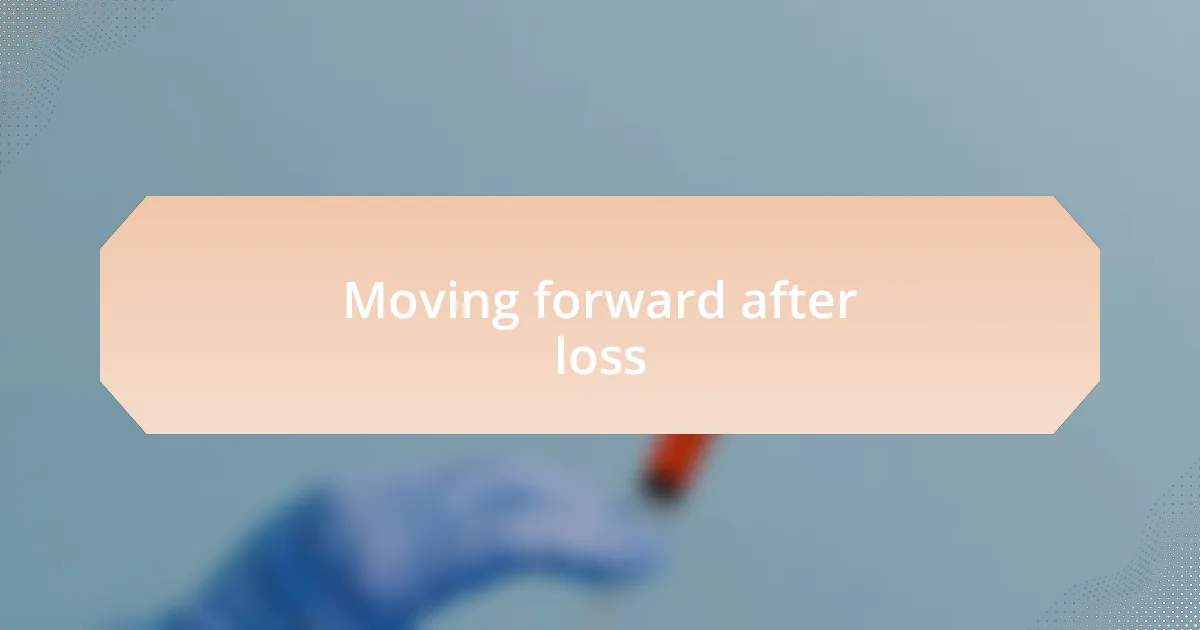
Moving forward after loss
Moving forward after loss can be an intricate dance between remembering and letting go. I once found myself staring at a photo of my loved one, feeling both comforted and shattered. Have you ever felt nostalgia wash over you, leaving you both warm and heavy? I learned it’s important to honor those memories while also creating new ones, allowing my heart to breathe.
As time passed, I began to understand that moving forward doesn’t mean forgetting. I started incorporating small rituals that reminded me of my loved one, like lighting a candle on special occasions or sharing stories with family. These acts helped me feel their presence, creating a bridge between my past and my new reality. Have you found ways to keep your loved one’s spirit alive in your life?
The journey towards healing also involved finding purpose in my pain. I decided to volunteer at a local hospital, providing support to those grieving. This experience opened my eyes to the shared nature of loss; it was empowering to connect with others carrying similar burdens. How has your experience with grief shaped your actions toward others? I’ve come to appreciate that helping others is a path to my own healing, reminding me that I am not alone on this journey.